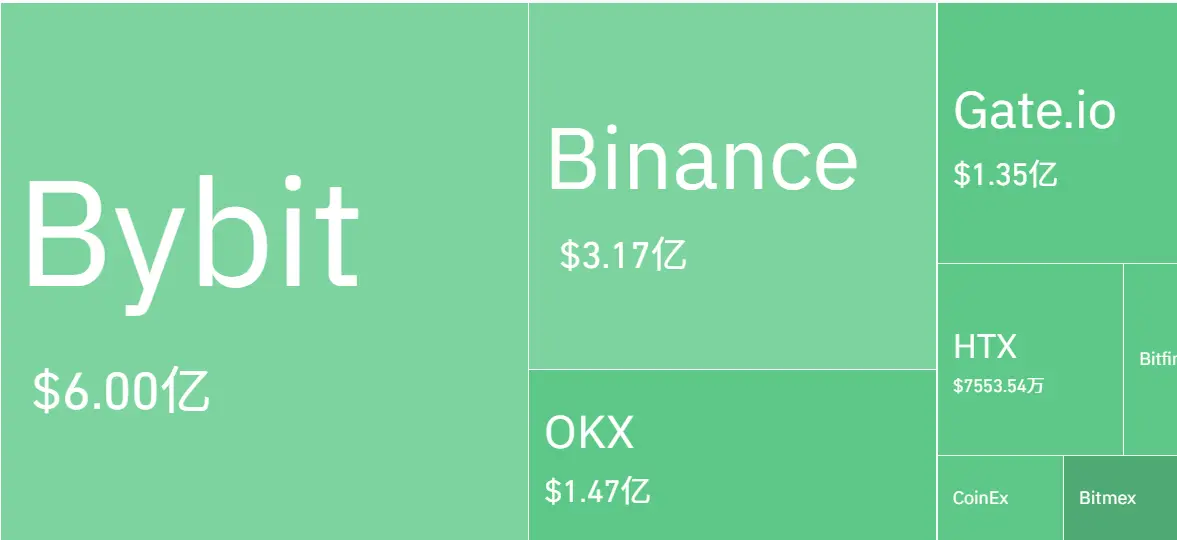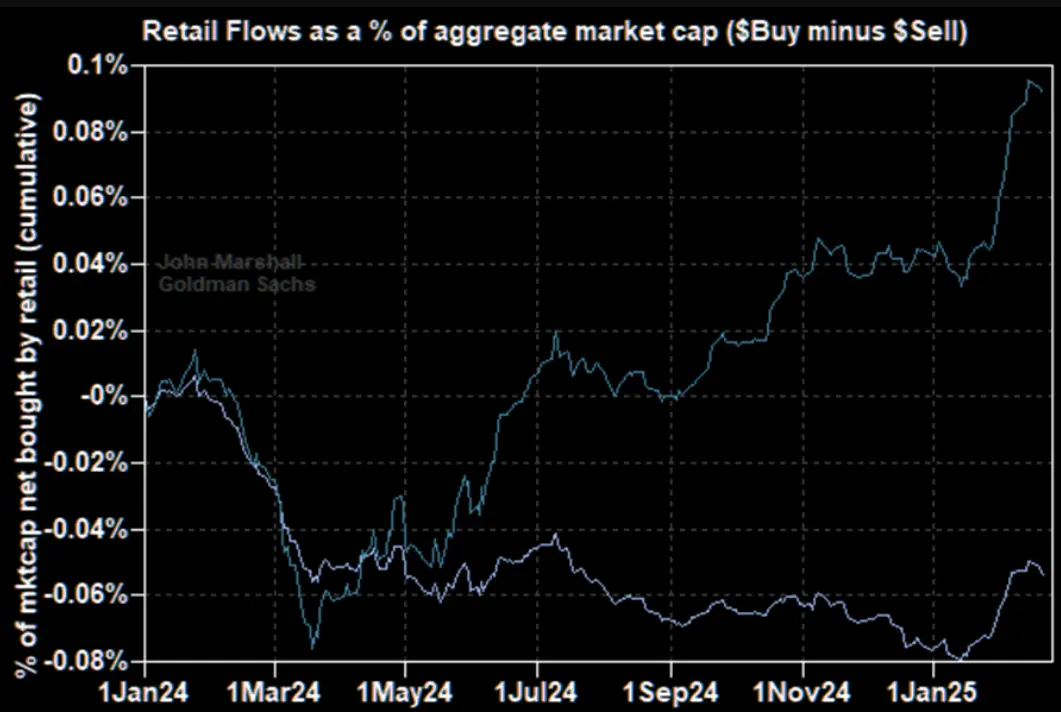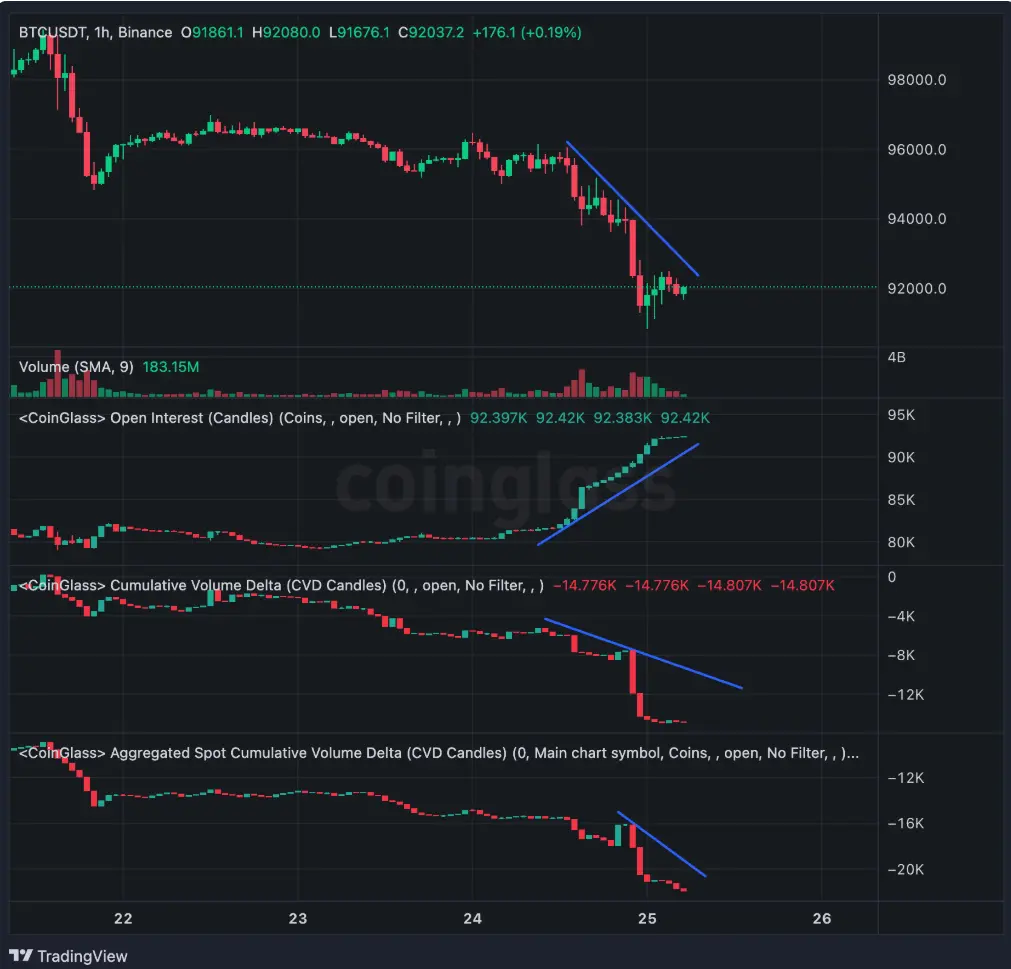Author: Scof, the Liquidated, ChainCatcher
Editor: TB, ChainCatcher
Before recovering from the aftermath of the hacking incidents at Bybit and Infini, the market faced another blow early this morning: as of the time of writing, according to data from Coinglass, a total of 373,863 people were liquidated globally in the last 24 hours, with a total liquidation amount of $1.405 billion. The exchange with the largest liquidation volume was Bybit, which is also a platform commonly used by institutions.

In addition, data from digital asset management company Arca shows that since mid-December last year, most tokens have lost value ranging from 30% to 80%, with Solana's market cap losing about $50 billion in the past month.
This article summarizes four reasons that led to the market crash for readers' reference.
Large-scale Hacking Events Often Lead to Market Crashes
Historically, significant hacking events tend to occur when the market is at a relatively low point, and there may even be further declines.
For example, in March 2022, $625 million was stolen from Ronin, and Bitcoin subsequently closed with bearish monthly candles in April, May, and June, dropping from $45,510 to $19,942;
In March 2023, Euler Finance was hacked for $197 million, causing Bitcoin to end its upward trend from the previous months and enter a six-month consolidation phase;
In July 2024, the Indian exchange WazirX lost $235 million, and the market, which had been oscillating for five months, closed bearish in August, with prices dropping from $64,628 to a low of $49,000.
The current Bybit incident is the largest theft in history. Although the most dangerous risk of a bank run has been successfully mitigated, the hackers will need to liquidate the stolen ETH or convert it into other cryptocurrencies, which will exert significant selling pressure on the market. At the same time, this process will also drain a large amount of liquidity from altcoins, making a season for altcoins unlikely in the short term.
MSTR Shifts to Convertible Bond Financing, Slowing BTC Purchases
On February 20, Strategy (formerly MicroStrategy) announced the pricing of a $2 billion convertible senior note offering and disclosed on February 24 that it had increased its Bitcoin holdings by purchasing 20,356 BTC at an average price of $97,514.
Previously, MSTR primarily financed through stock ATMs (selling stock directly in the market), rapidly increasing its Bitcoin holdings, purchasing $16 billion worth of Bitcoin in just a few months.
However, MSTR has recently changed its strategy to adopt convertible bonds (CB) for financing, which lowers financing costs but decreases execution efficiency, meaning it will no longer purchase Bitcoin at such a rapid pace. This shift has caused a short-term withdrawal of market liquidity, quickly squeezing out liquidity premiums, which may disappear, leading to downward pressure on the Bitcoin market.
Additionally, CB holders may convert their bonds into stock in the future, leading to dilution of MicroStrategy's equity. Investors are concerned about the company's long-term purchasing power decline, which weakens bullish expectations for Bitcoin.
Delayed Positive Policies and Consecutive Negative Policies
Positive policies from the government are often slow and gradual. Since Trump announced the national strategic reserve plan for Bitcoin, actual actions have yet to materialize, and he has been absent from the crypto market for a while, continuously eroding market patience.
Arthur Hayes, co-founder of BitMEX, has stated that the core issue with government asset accumulation is that it often trades for political rather than financial interests, leading to policy instability. The market's expectations for Bitcoin's strategic reserve have fallen short, further undermining investor confidence.
In addition to the delayed positive developments, the new tariff policy introduced by the Trump administration has undoubtedly added fuel to the fire. According to the latest proposal, Chinese shipping operators may need to pay a fixed fee of $1 million each time their ships enter U.S. ports, or $1,000 per ton based on the ship's net tonnage. Analysis suggests that this policy will directly cause shipping costs on U.S. routes to soar, indirectly triggering continued inflation or keeping it high, further suppressing expectations for interest rate cuts.
On February 25, Cointelegraph reported that during a legislative meeting on February 24, the South Dakota House Business and Energy Committee decided to postpone the HB 1202 bill to the "41st day" of the current legislative session. However, the state legislative session lasts a maximum of only 40 days, effectively killing the related bill and further dampening market sentiment.
Additionally, during the consensus conference, some major market makers indicated that Memecoins like TRUMP and LIBRA are absorbing liquidity from more mature cryptocurrencies, and the frenzy around meme coins is a key reason for the downturn in Bitcoin and the entire altcoin market, reminiscent of the price trends seen seven years ago.
Has the Bear Market Arrived?
Recently, news of Microsoft shutting down two data centers has raised concerns about the risk of oversupply in AI infrastructure, coupled with Trump's announcement of continued tariffs on Canada and Mexico, all of which have collectively undermined market confidence. According to 4E monitoring data, major U.S. stock indices generally performed weakly, with the Dow Jones Industrial Average barely rising by 0.08%, while the S&P 500 index fell by 0.50%, and the collective decline of tech stocks caused the Nasdaq index to drop by 1.21%.
Additionally, billionaire hedge fund founder Steve Cohen of Point72 stated during a speech in Miami that the Trump administration's policies could lead to a significant adjustment in U.S. stocks. Cohen expects U.S. economic growth to slow from 2.5% in the second half of 2025 to 1.5%, marking the first time he feels extremely negative in a while. He pointed out that Trump's tariff policies essentially act as a tax, which could provoke international trade retaliation, and immigration restrictions will negatively impact labor growth, while the anti-corruption initiatives implemented by the Department of Government Efficiency (DOGE) are effectively austerity measures. The combination of these factors will severely impact the U.S. economy.
With the S&P 500 index having risen over 50% since the beginning of 2023 and Nvidia's stock soaring by 800%, the current market valuation is at historical highs. The positions of hedge funds and retail investors are nearing their limits, significantly increasing the market's downside risk.

Jeff Dorman, Chief Investment Officer at Arca, stated: "The cryptocurrency market has been weak for eight weeks, and stocks, fixed income, and gold have not been affected by any indicators used to explain the weakness; only cryptocurrencies continue to decline. This is largely due to low market sentiment, losses from various failed meme coins, and a lack of funding to support new token issuance."
Analyst Godbole believes that the bearish candlestick chart seen on Monday indicates that more losses are likely to occur in the future, and futures activity suggests a large influx of new short positions. The cumulative trading volume delta (CVD) in Binance's futures and spot markets has turned negative and is further expanding as prices decline, indicating that selling pressure has exceeded buying activity.

Binance's BTC/USDT futures price with OI and CVD. (Coinglass)
Investor Chris Burniske noted that in 2021, BTC fell by 56%, ETH by 61%, and SOL by 67%, with many other altcoins dropping by 70-80%. Therefore, he believes we are still in the mid-cycle of a bull market, and those who think the market has entered a full bear market are actually misled.
However, overall, the market has entered a state of extreme panic, and a large-scale rally in altcoins is unlikely to occur in the future. There is an urgent need for actual positive policies to be implemented or for interest rate cuts to be achieved to support a short-term recovery.
免责声明:本文章仅代表作者个人观点,不代表本平台的立场和观点。本文章仅供信息分享,不构成对任何人的任何投资建议。用户与作者之间的任何争议,与本平台无关。如网页中刊载的文章或图片涉及侵权,请提供相关的权利证明和身份证明发送邮件到support@aicoin.com,本平台相关工作人员将会进行核查。




